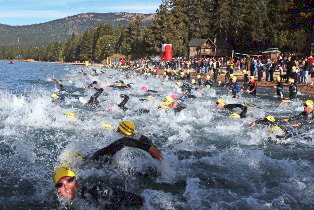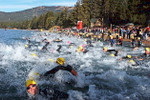The Athletes Most Secret Weapon- And It Is Legal!
Posted by Matt Russ on 11th Nov 2016
 Athletes are always looking for an edge. This may come in the form of a new supplement, gadget, piece of equipment, or training methodology. Many of these are of negligible or no value to performance enhancement. But the most effective ergogenic aid is actually readily available and free; it is sleep.
Athletes are always looking for an edge. This may come in the form of a new supplement, gadget, piece of equipment, or training methodology. Many of these are of negligible or no value to performance enhancement. But the most effective ergogenic aid is actually readily available and free; it is sleep.
First and foremost remember this; you are weaker after a work out. Your body has been broken down and it will take some time to repair itself. You will only benefit from the work out if this process is not upset or delayed. Your body releases a slew of hormones as you sleep, and one of the most important for recovery is Human Growth Hormone (HGH). This wonder hormone produced by the pituitary gland repairs muscles and connective tissue, making them stronger and able to handle an even greater training stress load. It helps rejuvenate organs and bones as well. After a good nights sleep you wake up refreshed physically and mentally; ready to resume the training process. Name a supplement that can safely accomplish that!
Adapt and Overcome
We are creatures of routine and we like to follow plans and programs, but this can work against us. One of the first things I tell my athletes is that their plan will need to be adapted throughout the season. Adapting an athletes plan is as important as designing a great training plan. The pros can train, eat, sleep, and repeat. For the rest of us training is not our job; it is in addition to our job. It is easy to upset the training process and we have to realize family and work responsibilities come first. There may be certain key work outs throughout your training week. If you need to increase rest and recovery, you can minimize lost training time by performing these work outs over other less critical ones. Don't feel you must follow the letter of your plan no matter what. A good coach will understand this as well. Don't stack missed work outs on the week end either. This type of overreaching leaves you exhausted and burned out going into your next training week.
Hello?
If you spent the night nursing a sick child you have to realize that the 3 hours of sleep you got is not enough to train on. You may find your body sore and achy, and mentally you are in a fog. In this situation are more susceptible to accidents and injuries, and your immune system is suppressed. If you attempt to train hard, not only will your work out be substandard, you will further break the body down requiring even more recovery. That means you are moving in the opposite direction you desire, and are in fact are making yourself slower. Realize the body is a machine like any other and will reach a breaking point. Listen to your body. A day off from training and a good night of sleep will get you back in the game. This means resuming quality, effective training versus going through the motions of training.
Stress is Stress
Your body reacts to physical and mental or emotional stress in a very similar manner. The hormone Cortisol is released in both cases. You may have sat in your office chair all day, so the presumption is that you are ready physically for a work out. But if you have been under intense mental stress, you may find yourself exhausted instead. If you are experiencing a relationship issue and work is picking up the pace, your training may need to be modified. Training can help relieve stress but striking the balance may be tricky. Instead of attempting to achieve a specific training goal, you may want to work out at a base or recovery level until your stress levels return to a normal level. During these periods you are at a high risk for over training; especially when sleep becomes compromised. If you cant get to sleep, or are waking up at night, it is a good indication that your recovery bank is getting low.
How Much is Enough?
I have worked with athletes that can recover well on very little sleep; even after a high volume of training. Recovery is individualized however, and these athletes are the exception. As training volume comes up you may need more rest to accommodate recovery. However, we seldom increase our sleep in compensation. I have found that 7 hours is approximately the minimum for athletes, with some needing more than 9 hours. Quality of sleep is important as well as quantity. If you are not hitting that deep REM sleep, recovery is hindered. There are now sleep clinics to help you identify and address your specific sleep issue. A post work out power nap can help recovery if you are not getting quite what you need, but keep it short (20-30 minutes) or you may not be able to get to sleep that evening.
There are some habits you can get into to improve your sleep. Take some quiet time before bed to meditate, relax, and bring your stress levels down. Choose passive activities and avoid stimulation. Also avoid working out intensely within three hours of your bed time, and keep it consistent. Optimally alcohol, nicotine, and caffeine should all be avoided, especially after early afternoon. Keep your room dark and use a night light. Some studies show turning on a bright light disrupts sleep patterns.
Track It
Our coaching software allows us to track athletes sleep quality and amount, as well as quantify stress metrics. When an athlete indicates they are in the red we can adjust training accordingly. A training diary is a good way to track of how you are reacting to your training and stress levels overall. Track your sleep amount and quality as well as your attitude towards training, stress levels, and post work out fatigue. This will often give you insight as to how much sleep you need. There are some common signs that you are not getting enough sleep.
- Irritability or short temper.
- Daytime drowsiness or falling asleep during the day.
- Loss of focus and concentration.
- Forgetfulness or short term memory loss.
I often consult with athletes that are training very hard, yet are chronically injured, burned out, and not getting faster. Simply they are not recovering. By reducing volume and increasing recovery we can sometimes drastically improve performance. The athlete that works the hardest and most consistently does not always progress. As athletes we train ourselves to push through pain, fatigue, and to persevere; but this can work against us. Consider that you are in a race for recovery, not speed, and sleep is your secret weapon. It is possible you can beat the competition by out sleeping them.
Matt Russ is a full time professional coach with over two decades of experience working with athletes up to the professional level. His athletes have achieved numerous regional, national, and international titles under his direction. Matt has achieved the highest level of licensing by both USA Triathlon and USA Cycling, and is a licensed USA Track and Field Coach. His accomplishments include being named "Team USA" Coach by USA Triathlon. Matt is Head Coach and owner of The Sport Factory, a USA Triathlon Certified Performance Center located in Roswell, Georgia. Visit www.sportfactory.com for more information or email him at coachmatt@sportfactory.com


